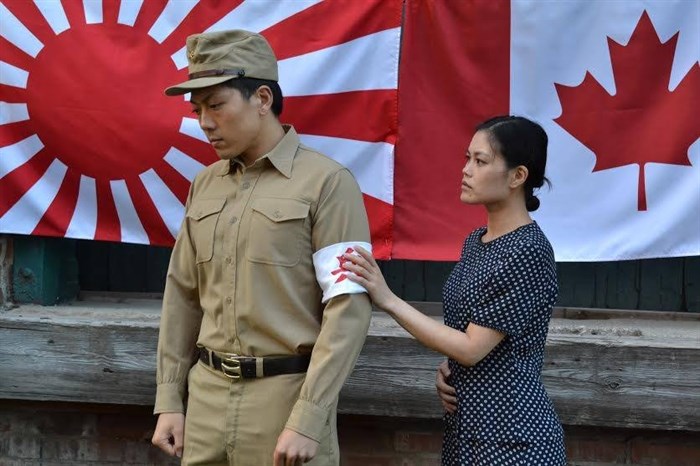
Scene from "Interrogation: The Lives and Trials of the Kamloops Kid."
Image Credit: Jessica Dix
July 09, 2015 - 8:00 PM
ONE OF ONLY TWO CANADIANS HANGED FOR TREASON
KAMLOOPS – His name is Kanao Inouye.
He was only the second, and currently the last Canadian ever tried and hanged for treason. He was a first generation Canadian, born and raised in Kamloops to Japanese parents. He returned as an adult to Japan to study, but the outbreak of war changed his life and his place in history forever.
Writer Evan Mackay has resurrected Inouye’s story. The play called Interrogation: Lives and Trials of the Kamloops Kid being performed currently during the Toronto Fringe Fest. For Mackay, the story had a personal connection.
“My friend Karri Yano told me this tale of her father’s uncle, who is the only Canadian hanged for treason since Louis Riel. It was really shocking because her family is such a great group of people, they’re such law-abiding citizens I couldn’t imagine someone in her family being tried for war crimes or treason.”
Yano who not only gave him the idea but helped write the play as well.
Mackay sourced most of the historical data for the play from the 2013 PhD thesis of Mark Sweeney of the University of Waterloo. Writing specifically about Japanese War crimes, Sweeney wrote an entire chapter dedicated to Inouye.
According to Sweeney, in 1942, Inouye was conscripted in the Imperial Japanese Army and acted as an interpreter. Inouye was said to be a particularly aggressive interrogator, burning people with cigarettes and otherwise relishing in torture.
First tried for war crimes, this conviction was overturned because as a Canadian he could not be guilty of the actions of an enemy army. Mackay says Inouye was called during trial a "guest of the Dominion of Canada." Because of this, he was tried again this time for treason and eventually hanged in a Hong Kong prison.
Although Inouye is not a man many would feel is worth remembering, Mackay found Inouye’s story compelling for a number of reasons. While he was declared a traitor to Canada during the Second World War, his father Tadashi was a decorated Canadian veteran of the First World War.
The transformation of Inouye from, by all accounts, a normal Canadian kid into the torturer infamously known as the Kamloops kid was another reason to explore the story.
“He was first a victim of torture before he was a torturer. Of course this isn’t an excuse but it surely influenced where he wound up,” Mackay says of Inouye’s first initiations into the Japanese army.
According to Sweeney's research, very little is known about Inouye’s life in Kamloops, almost all information comes from trial transcripts. While it seems he had an otherwise idyllic childhood growing up in Kamloops – Mackay says during his first trial Inouye testified he was “trapped in Japan and had always wanted to return home to Canada” – he was still very much considered an outsider. By his second trial he did an about face and said he suffered terrible racism at home.
“I suspect both parts were true,” Mackay says, understanding that Inouye grew up during a different time.
Mackay found this story incredibly timely. Not only is this year the 75th anniversary of World War Two, he says the only other Canadian tried for war crimes was Omar Khadr; a major figure in the news of late. He says history can often be cyclical as ‘normal’ Canadian kids have chosen to join extremist factions.
“(I wrote the play) because of young people from the west going off and joining ISIS and fighting for a cause that is hard to understand what their connection is to it. But there is something about people seemingly fighting for the wrong side,” he says.
Interrogation has enjoyed a week of performances during Toronto’s Fringe Festival, with the last shows scheduled for this coming weekend. So far, Mackay has been happy with the reaction from audiences.
“I’ve been surprised at how uniformly positive the response has been. I expected negative feedback in two ways. I thought Japanese Canadians would say they were not being portrayed fairly and I thought maybe if there was attention from veterans they would say ‘how dare you show another side to this guy’s story he was terrible’,” Mackay says.
The goal of the play was not to turn Inouye into a sympathetic character, but instead to examine his life and draw parallels between his story and perhaps the Canadian immigrant experience.
“How much of your identity do you choose for yourself and how much is really imposed on you?”
To contact a reporter for this story, email Dana Reynolds at dreynolds@infonews.ca or call 250-819-6089. To contact an editor, email mjones@infonews.ca or call 250-718-2724.
— This story was updated at 10:40 a.m., July 10, 2015, to note Yano as co-writer of the play.
News from © iNFOnews, 2015